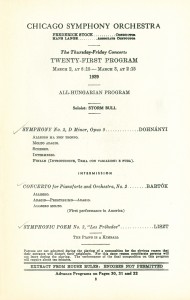
The Chicago Symphony Orchestra presented the U.S. premiere of Béla Bartók’s Second Piano Concerto on March 2, 1939, in Orchestra Hall. Twenty-five-year-old Storm Bull—who was, for three years, a student of the composer in Budapest— was the soloist and Frederick Stock conducted.
“Storm Bull is not at all the angry fellow that his name suggests but a smiling, sunny, spirited youth who looks barely out of his teens,” wrote Edward Barry in the Chicago Tribune. “[He] revealed himself as an immensely facile pianist. Everything comes off for him without apparent effort. He possesses a good sense of rhythm, and manages to make the music walk along for him in an infectious way. . . . The new concerto is a glittering creation whose colors are mostly on the light side. Its headlong line breaks only two or three times to allow place for perverse little poetic episodes. The concerto’s free harmonic scheme gives it a pleasant, out-of-focus, or oddly angled quality— as if a photographer should decide that the world is better seen obliquely than head on.”
Two years later, on November 20 and 21, 1941, Bartók—in his only appearances with the Chicago Symphony Orchestra— performed his Second Piano Concerto, also under Stock. Barry reported that the concerto was “easier on second hearing. . . . We were impressed by the concerto’s enormous rhythmic vigor, the consummate skill with which the composer handles its shifting harmonic background, the challenging way in which dynamic extremes are used, and the frequent emergence of perfectly clear and meaningful melodies. Mr. Bartók softened some of the concerto’s severity and played down its extreme percussiveness. Much of the performance was sensuously beautiful.”
Image above: Béla Bartók’s program biography from November 20 and 21, 1941
This article also appears here.
